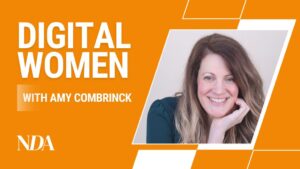NDA has launched a new interview series, CMO Confidential: Adtech. This series profiles CMOs at leading adtech companies to discover what the CMO role means to them, why it’s needed and what industry trends they are harnessing to drive success. The series complements our existing CMO Confidential series which talks to brand-side marketers.
We kick off with Nadia Gonzalez, CMO at Scibids.
What does the CMO role mean to you?
The CMO role has many facets encompassing creativity, storytelling, sales, usage data, and analysis. As an adtech marketer for many years now, the CMO role is both an art and a science, because you have to tell a technical story with a clear and compelling message that will resonate with the prospect decision-makers you’ve identified within media buying or publishing organizations.
As the CMO of Scibids, the role means orchestrating a coherent strategic vision for the brand and its market presence. It involves leveraging entrepreneurial and executive background to drive growth and establish Scibids as the innovator and leader in AI for digital advertising. I’m pleased to say that every startup that I have been a part of (AdMeld, Sociomantic, Orchard Platform, and Scibids) has been acquired, so I’ve been lucky enough to see how a company moves through the growth stages – from early stage to exit. More importantly, for my path to CMO, being a part of these marketing teams that have supported such successful trajectories has been both humbling and awesome!
Why does an adtech company need a CMO role?
Good question! I’ve been fortunate enough to join a number of startups in their early stages, and I’ve seen the following play out many times: technical founders get a great idea off the ground and receive an initial round of funding.
They put the initial slide deck together, describing their new tech emphatically. They then find themselves needing to learn how to sell, do all the marketing and account management, etc. Initially, the founder’s enthusiasm may carry the day, but as the start-up grows, so too does the complexity of sales and service.
Who are my ideal customers? Does my messaging appeal to them? Are my salespeople faithfully delivering the message I expect? What’s working? What isn’t? Beyond these considerations, competition shows up, requiring yet more rigour in differentiating the offering. Meanwhile, founders need to focus on what they do best and may not be best suited to handle the details of what a good and consistent marketing program requires
In the adtech landscape, where technology, data, B2B client and end-customer behaviour intersect, a CMO plays a pivotal role in crafting and communicating the value proposition of the company. A CMO ensures that the company is best articulating the value being created and for whom.
They also have the capacity (and, in my opinion, the empathy) to work with a sales and service organisation to extract the best information possible from customers, inevitably using that information to embolden the right revenue, from the right customer as quickly as possible.
Especially in today’s fast-paced and noisy ad tech market, in which hundreds of well-intentioned technologies vie for market share, presenting your wares in value-based terms, which are articulated crisply, succinctly and forcefully, and are mindful of the macro environment in which you operate (economically, from a regulatory perspective, from a competitive perspective, etc), could not be more important.
You have to get it right, and you have to get it right the first time. Otherwise, you waste valuable time, suffer from a lack of critical growth, and you sacrifice opportunity cost. And that’s no fun.
How has the CMO evolved over the last 5 years?
In adtech the CMO role has evolved significantly, driven by the rapid changes in data availability, technology, consumer behaviour, regulation, and the everpresent shadow of Big Tech. CMOs are now more data-driven and tech-savvy, leveraging analytics and AI to understand and respond to customer needs.
Clients of sophisticated adtech platforms expect strong products and narratives supporting more and more of their ad spend – that is, across digital channels. With the rise of sophisticated marketing technologies like Scibids AI, CMOs are leveraging data analytics, AI, and automation tools to gain deeper insights into customer behaviour, optimise marketing campaigns, and enhance the overall customer experience.
Additionally, the B2B CMO is now intricately involved in revenue generation and business strategy. Rather than being confined to the realm of branding and lead generation, CMOs are actively collaborating with sales teams, aligning marketing efforts with the sales funnel, and demonstrating how marketing initiatives directly contribute to the bottom line.
With such wide-ranging responsibilities, how do CMOs keep up with the speed of technological change and the change in customer behaviour it drives?
Staying abreast of technological changes and evolving customer behaviors is crucial for a CMO. Continuous learning, attending industry conferences, networking, and fostering partnerships with technology leaders and industry bodies are essential. Additionally, maintaining an agile and adaptable marketing team, investing in training programs, and leveraging data analytics and AI tools help in understanding and responding to shifts in technology and consumer preferences swiftly.
One of my greatest lessons in building marketing output, especially product marketing, is to work closely with the engineering and data science teams. If a product is being built without a cohesive narrative from the start, it will simply delay revenue.
It takes more time to produce solid messaging that complies with existing company and product strategy, identify owned and earned marketing opportunities, train the commercial teams, and establish a feedback loop to understand what is and isn’t working. I’ve learned to ensure that the right marketing people are in the appropriate engineering and data science meetings to ensure messaging cohesiveness and support for product rollouts.
What misconceptions of the CMO role come from the rest of the C-Suite – and how do you overcome them?
One common misconception is viewing marketing as a cost centre rather than a revenue driver. To overcome this, I focus on demonstrating the direct impact of marketing efforts on business outcomes, emphasizing metrics such as customer acquisition cost, customer lifetime value, and return on investment.
Open communication and collaboration with other C-suite members also help in aligning marketing strategies with overall business objectives. Really great PR that involves a customer that is willing to talk also helps. When a salesperson is able to show a prospect that a named brand customer is actively using the product, it’s immediate value for the entire revenue organization. That kind of social proof is pure gold.
What technologies at your disposal are you most excited about at the moment in your role?
Given Scibids’ focus on artificial intelligence for digital marketing, I’m particularly excited about advancements in machine learning, predictive analytics, and automation tools. I’ve learned so much about AI in the past three years that I’ve done a number of presentations for industry bodies like the 4As and the IAB to inform their leadership of the difference, for example, between generative AI, and predictive AI solutions like Scibids.
Predictive technologies leverage machine learning to enable us to enhance the precision, efficiency, and scale of our advertising solutions, providing a privacy-friendly competitive edge in the dynamic adtech landscape. There are also a lot of really fun things you can do with generative AI, as we’ve learned from interacting with ChatGPT and language models built on its open-source technology. However, when it comes to scaling revenue, understanding the advantages of customizable and dynamic predictive AI will add more value to the bottom line.
Who is your biggest personal inspiration in our industry and why?
There are a lot of great marketers and executives out there, and many people who have helped me along the way, like Tom Jenen, Erika Alonso, Tom Polley, Ben Barokas, and Michael Barrett.
I wouldn’t be where I am today without them.
*Scibids is a client of Bluestripe Communications, owned by Bluestripe Group, the publisher of NDA.









